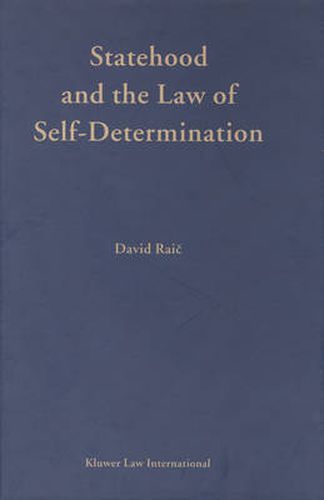Readings Newsletter
Become a Readings Member to make your shopping experience even easier.
Sign in or sign up for free!
You’re not far away from qualifying for FREE standard shipping within Australia
You’ve qualified for FREE standard shipping within Australia
The cart is loading…






Although most international lawyers assumed that the distribution of the land surface of the earth between States was more or less final after the end of decolonization, recent practice has disproved this assumption. Eritrea separated from Ethiopia and new States were created out of the former Soviet Union, the former Yugoslavia and the former Czechoslovakia. There is no reason to believe that these events form the end of the creation of new States. Numerous communities within existing States claim a right to full separate statehood on the basis of their entitlement to an alleged right to self-determination. However, in most cases, the international community rejected such claims to statehood, even if the territorial entity satisfied the traditional criteria for statehood. On the other hand, in other cases, including some of those mentioned above, the international community acknowledged the statehood of entities which clearly failed to meet these criteria. In the light of the above-mentioned developments, this book examines the modern law of statehood, and in particular the role of the law of self-determination in the process of the formation of States in international law. The study shows that the law of statehood has changed considerably since the establishment of the United Nations. It is argued that the law of self-determination is particularly relevant for explaining the international community’s position regarding the general recognition, or the general denial, of statehood of different territorial entities under contemporary international law.
$9.00 standard shipping within Australia
FREE standard shipping within Australia for orders over $100.00
Express & International shipping calculated at checkout
Although most international lawyers assumed that the distribution of the land surface of the earth between States was more or less final after the end of decolonization, recent practice has disproved this assumption. Eritrea separated from Ethiopia and new States were created out of the former Soviet Union, the former Yugoslavia and the former Czechoslovakia. There is no reason to believe that these events form the end of the creation of new States. Numerous communities within existing States claim a right to full separate statehood on the basis of their entitlement to an alleged right to self-determination. However, in most cases, the international community rejected such claims to statehood, even if the territorial entity satisfied the traditional criteria for statehood. On the other hand, in other cases, including some of those mentioned above, the international community acknowledged the statehood of entities which clearly failed to meet these criteria. In the light of the above-mentioned developments, this book examines the modern law of statehood, and in particular the role of the law of self-determination in the process of the formation of States in international law. The study shows that the law of statehood has changed considerably since the establishment of the United Nations. It is argued that the law of self-determination is particularly relevant for explaining the international community’s position regarding the general recognition, or the general denial, of statehood of different territorial entities under contemporary international law.